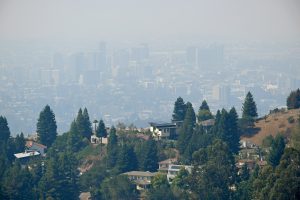Sarah Vogel, Ph.D., is Senior Vice President, Healthy Communities
 Cutting methane emissions is one of the fastest, most effective ways to stabilize the climate. It can also improve public health.
Cutting methane emissions is one of the fastest, most effective ways to stabilize the climate. It can also improve public health.
Today, 130 countries are committed to cutting methane emissions by 30% by 2030 as part of the Global Methane Pledge. As countries work to meet these commitments and more nations join the Global Methane Pledge, there is an opportunity to identify and implement solutions that both reduce methane emissions and improve the public’s health. Finding climate solutions that center health and wellbeing of people is essential if we are to secure a vital Earth for everyone.
At this year’s COP in Sharm El-Sheikh, Egypt, we have a unique opportunity to bring together experts on oil and gas, agriculture, waste and public health on November 15 at the Health Pavilion to discuss the nexus between methane and health as well as opportunities for action.
WHY IT MATTERS
Methane is a short-lived climate pollutant, and cutting these emissions is important because it is the fastest way to advance global climate goals while also achieving significant near-term public health benefits. Methane contributes significantly to the impacts of climate change on our health–from extreme heat to increased risk of infectious disease. It contributes to ground-level ozone and particulate pollution, which damages airways, aggravates lung diseases, causes asthma attacks, increases rates of pre-term birth, cardiovascular morbidity and mortality, and boosts stroke risk.
Consequences from these health impacts include lost productivity, higher medical costs, and greater pressure on health systems. By suppressing crop growth, ozone can also exacerbate food insecurity.
But there’s also reason for hope. We can prevent vented and fugitive methane emissions with existing technologies, and our ability to identify methane leaks continues to improve. By taking full advantage of such tools and targeting super emitters, policymakers can advance climate action while delivering enormous health benefits regionally as well as to communities living near oil and gas operations.
We can also reduce methane emissions in agriculture and solid waste management. Providing livestock with higher-quality feed would cut methane produced during digestion, improve the animals’ health and deliver more nutritious dairy products for people. Capturing methane from manure and treating digestate to minimize ammonia emissions (precursors of particulate matter) would provide a local source of energy, reduce odors, and mitigate public health risks of those living nearby.
It is crucial to highlight the near-term health benefits of cutting methane. With the help of researchers and community-health practitioners who understand the issue best, we hope to generate the support, collaboration and investment needed to cut methane emissions and improve public health worldwide.
With support from the Wellcome Trust, EDF will convene a series of dialogues in early 2023 about the health-methane nexus and hold a workshop during the UNFCCC Intersessional in Bonn to collaboratively develop recommendations to the UNFCCC for presentation at COP28.
Watch the “Health-Methane Nexus: Opportunities for Action” panel livestream from COP 27 at 10:00 a.m. EET (Egypt)/3:00 a.m. ET or view the post-event recording at GlobalCleanAir.org Convenings.











